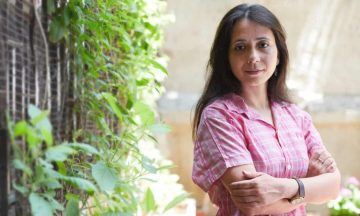Ashish Ghadiali in The Guardian:
 Annie Zaidi was already a writer of renown in Mumbai when, in 2019, she submitted a 3,000-word essay to the Nine Dots Prize, an international competition lavishly sponsored by investment banker Peter Kadas, and won $100,000 as well as a book deal. Bread, Cement, Cactus, her haunting evocation of belonging and dislocation in contemporary India, is the fruit of that endeavour, delivering Zaidi on to an international platform for the first time in her decade-long career. The brief was to say something new about “home” – a concept that Zaidi quickly establishes has always evaded her. “I never lived,” she tells us, “in the city of my birth … (Allahabad, now Prayagraj, in Uttar Pradesh). Leaving us with her parents [in Lucknow] while she went back to university, my mother quit a bad marriage.” Later, she found a job and moved to a remote industrial township in Rajasthan where “the need for bread, and milk for the children, overrode her unease at being so far from everything familiar”.
Annie Zaidi was already a writer of renown in Mumbai when, in 2019, she submitted a 3,000-word essay to the Nine Dots Prize, an international competition lavishly sponsored by investment banker Peter Kadas, and won $100,000 as well as a book deal. Bread, Cement, Cactus, her haunting evocation of belonging and dislocation in contemporary India, is the fruit of that endeavour, delivering Zaidi on to an international platform for the first time in her decade-long career. The brief was to say something new about “home” – a concept that Zaidi quickly establishes has always evaded her. “I never lived,” she tells us, “in the city of my birth … (Allahabad, now Prayagraj, in Uttar Pradesh). Leaving us with her parents [in Lucknow] while she went back to university, my mother quit a bad marriage.” Later, she found a job and moved to a remote industrial township in Rajasthan where “the need for bread, and milk for the children, overrode her unease at being so far from everything familiar”.
Each chapter is a standalone essay, as Zaidi looks back to the successive settings of an itinerant past, successfully dovetailing personal reflection with political analysis so that, in each location, intimate memories work as jumping-off points for research and investigation into the macro-trends that are shaping contemporary India. In that Rajasthani township, JK Puram, for example, Zaidi’s recollection of youthful discontent plays into a reckoning with the horror of tribal dispossession as stories from her childhood of “Bhil tribesmen … who could relieve kids of their valuables” are slowly recast.
…In the end, the architecture of the book attempts to lead us towards a counter-resolution that will establish home instead in the paradise of personal experience – in “the morning mist” for example – but this is never as convincing as the lasting sense of indignation and injustice that Zaidi evokes. “What belongs to whom?” she asks. “Who pays the costs of what is taken and cannot be returned?” These are questions perhaps more powerful than the answers Zaidi can provide, but it’s through questions such as these that she points towards the deeper mysteries of our human condition.
More here.
